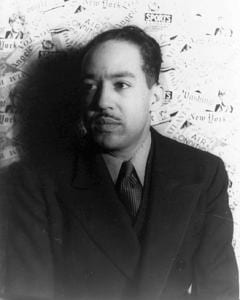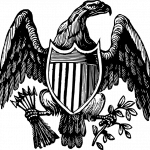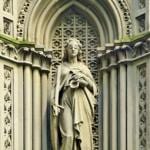Final Curve
When you turn the corner
And you run into yourself
Then you know that you have turned
All the corners that are left.*
“We are,” I thought, “recovering from Harvey.” Proud of Houston and of our community, I thought we were turning the corner and then friends in China began to talk of a virus. “We are,” I thought, “turning the corner on this pandemic.” And then the snow began and the water stopped, we did our best, discovering melting snow works to keep the flush in flush toilet, and yet faced much less difficult times than millions of others.
I decided not to think about turning the corner when the power came on and water stopped! Times are what they are and waiting for a beautiful day when everything is going my way is a fool’s game. There are limited good days then and we have eternity in our hearts. We need to stop turning corners and meet ourselves: this is the lesson of the final curve.
Langston Hughes, the author of this profound poem, learned more Christianity as a child, understood more reality as a man than most of us more faithful to Christ will ever learn or understand. He understood that the city of man, the one we have built just now, appears to have a lot of alleys down which we can turn. There are night spots where we can seem to hide and corners to turn, escapes. He tried them all and came to the final curve.
The corner turning, the byways, contrasts with the Christian picture in Pilgrim’s Progress: there is one way that leads to salvation. Every hero presented with the easy command to “follow the way” struggles to do so. Instead of a Pilgrim’s Progress, we hope that there is not one way, straight and narrow, as this often takes us through pandemics and storms. We are presented a “yellow brick” road, told to stay on the path, but still hope we can cut a corner or two. Look over there! We need not see ourselves, learn to know ourselves as Socrates suggested, knowledge is just around that other corner.
Truth is, however, that the city of man is just a shadow of the City up ahead. This ghostly city seems real and full of interesting byways. If times are tough, maybe prosperity is just around the corner over there. If we do not endure with virtue and courage, cut some corners, we escape hard lessons until good times come again. Prosperity returns and we face World War II! Eventually, if we are paying attention, we understand that though we have choices, there are no corners to cut in the Divine Plan.
History heads for a consuming consummation in Christ.
We can chase the shadows, pretend they are “turns,” but we are only turning a corner in our minds. In reality we are going toward the City of God growing older daily and the City of God is coming toward us. Consider: running from ourselves is impossible as we are the ones running. We turn a corner and find we are still where we were: on the path moving inexorably Godward with the same choices. We can, then, note the weather of the age, pray for deliverance from plague and weather, but realize that we can still learn what we are sent here to learn in all times.
So I am reminded that a “return to normalcy” is impossible as any old normal was just a moment in time, good for some (maybe me?), but not so good for others. We are never go back and cannot wish to go back. If Arthur returned to rule, and here is wishing, then Camelot would not be like the old Camelot. We have learned a thing or two. We have not progressed so much as we realized that all those old “turns” just were whipping around in a circle. We are still here. Justice is unchanged.
 Langston Hughes is my favorite American poet . . . since fifth grade! (This was one of the few things to come from that no-good year.) He always is worth reading.
Langston Hughes is my favorite American poet . . . since fifth grade! (This was one of the few things to come from that no-good year.) He always is worth reading.
*Hughes, Langston. Selected Poems of Langston Hughes (Vintage Classics) (pp. 118-121). Knopf Doubleday Publishing Group. Kindle Edition.












